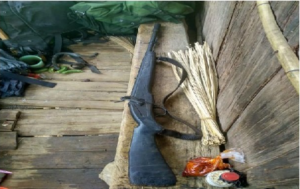 A gun was discovered in a poacher’s camp on one of the eight patrols carried out by the Lingkar Rapid Response team in Bengkulu during the first part of the year. In another, five cable snares were uncovered hidden in a different camp.
A gun was discovered in a poacher’s camp on one of the eight patrols carried out by the Lingkar Rapid Response team in Bengkulu during the first part of the year. In another, five cable snares were uncovered hidden in a different camp.
120km were walked by the teams over rough mountainous terrain for both routine and information-driven patrols. The confiscated gun was destroyed at the site by the team, but a protocol was later established, that evidence like this should be submitted to the National Park or appropriate Government authority for further investigation.
A second and this time much higher calibre gun was sighted by a patrol as two men were seen leaving the forest. Being unarmed, however, the patrol did not stop them. Later, meetings with local police established that these men were members of a poaching syndicate, one of whom had been arrested in a TPCU law enforcement action in Mukomuko. Further discussions disclosed that the leader of this gang was also known to police for arms offences.
A key objective of this project is to work alongside religious leaders to socialize a national fatwa issued by the MUI in 2014. Activities were conducted in two Kerinci Seblat National Park-edge districts in partnership with local leaders of the Islamic Scholars Council of Indonesia. They focused on park-edge villages identified as sources of poaching threat to tigers and other endangered species. In some villages, this has been more successful than others, as an example given in the report shows that a village home to two known poachers was reluctant to participate.
You can read more about this and other activities carried out by Lingkar Institute by downloading the full report

